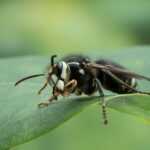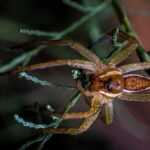Ant Toilet Habits: Do Ants Poop?
Yes, ants do poop. They produce waste called frass, which consists of tiny pellets that often resemble sawdust or fine powder. This article explores the fascinating world of ant waste, how ants manage their excrement, and the surprising roles it plays within their colonies and the broader environment, including important insights into the question: do ants poop? Understanding how ants poop reveals much about their social behavior and colony health.
- Ant waste, known as frass, varies in appearance depending on the ants’ diet and can provide valuable information about the health and activity of the colony.
- Worker ants play a vital role in maintaining colony hygiene by managing waste, sharing food, and ensuring a clean living environment.
- Ant frass is nutrient-rich and can be used as a natural fertilizer, benefiting soil health and promoting sustainable agricultural practices.
- Certain ant species, such as black garden ants (Lasius niger), have been observed to create designated indoor toilets in their nests, a remarkable behavior that highlights their advanced sanitation strategies.
Understanding Ant Poop: What is Frass?
Ant waste is commonly called “frass.” Unlike the typical feces of larger animals, ant frass often looks like sawdust or small pellets. For example, carpenter ants produce frass that resembles fine wood shavings due to their wood-based diet, while other species produce darker, pellet-like droppings.
Frass is not just waste; it serves several ecological and biological functions. Its appearance and composition can indicate the diet of the ants and the presence of particular species in an area. Entomologists and pest control experts use frass as a key indicator to identify infestations and evaluate colony health.
The term frass is also used across the animal kingdom to describe the fecal matter of many insects, including caterpillars and termites, highlighting its importance in insect biology.
The Digestive Process of Ants
Ant digestion is an efficient process involving two main components: breaking down food and distributing nutrients. When ants consume food, their bodies extract necessary nutrients, and the leftover waste — rich in undigested food and uric acid — is expelled as frass.
Ants have a unique digestive system with two stomachs: one for storing food to share with other colony members and another for digestion. Worker ants often regurgitate food to feed larvae and other ants, ensuring the entire colony receives balanced nutrition.
Interestingly, ant feces contribute to the colony’s unique pheromonal signature. The fecal matter contains chemical cues that help ants recognize colony members and maintain social order, a sophisticated communication method that underscores the complexity of ant societies.
How Ants Manage Waste: The Role of Ant Toilets
Ants are meticulous about waste management. Many species, including Lasius niger (black garden ants), designate specific areas within their nests as toilets, often located in the corners of chambers. These toilets contain only feces and are kept separate from other waste products like nest debris and dead bodies.
This separation is vital for maintaining hygiene and reducing the risk of disease within the colony. Worker ants regularly clean and disinfect these toilet areas, showcasing an advanced level of social organization.
Interestingly, ants prefer to defecate indoors, possibly to avoid exposure to dangerous stuff like predators and environmental hazards outside the nest. This behavior was observed in controlled experiments using white plaster nests, where researchers fed ants sugar water dyed with blue and red coloring to track waste locations over two months.
If you notice signs of ant waste or frass in your home, it may be time to seek assistance from professional pest control to prevent infestations and protect your property.
The Role of Worker Ants in Sanitation and Colony Health
Worker ants act as the colony’s sanitation crew. They remove waste and nest debris, preventing contamination and the spread of pathogens. They also dispose of dead ants and other refuse by carrying it outside to kitchen middens—designated trash piles that keep the nest clean.
Besides waste management, worker ants share food through trophallaxis, regurgitating nutrients to feed larvae and other colony members. They adjust their foraging based on the colony’s needs, gathering protein-rich food when larvae are present and sugar-rich food otherwise.
This adaptive behavior ensures the colony’s survival and efficiency, demonstrating the critical role worker ants play in maintaining colony health.
Nutritional and Ecological Benefits of Ant Frass
Ant frass is rich in essential nutrients like nitrogen, phosphorus, potassium, and organic carbon, all of which improve soil fertility. Its application as an organic fertilizer enhances soil structure, water retention, and microbial activity, making it valuable for sustainable agriculture and gardening.
Moreover, ant frass contains antifungal and antibacterial compounds, which can help protect plants from diseases and pests. Some studies suggest that frass can induce systemic resistance in plants, further boosting their ability to withstand environmental stresses.
Beyond the colony, ant frass contributes to nutrient cycling in ecosystems, benefiting other creatures and plants by enriching the soil.
Unique Toilet Habits Among Different Ant Species
Different ant species exhibit varied toilet habits. Black garden ants (Lasius niger) have been observed to create distinct indoor toilets within their nests, as confirmed in experiments led by lead author Tomer Czaczkes at the University of Regensburg. These toilets are often marked by brown or dark patches on the walls of white plaster nests.
In contrast, carpenter ants leave frass piles outside their nests, often visible as sawdust-like mounds beneath infested wood. These frass piles help pest control experts identify infestations.
Other insects, like caterpillars, simply leave their frass scattered, while termites incorporate their waste into building material for their nests.
Ant Poop and Colony Identification
Ant poop plays a surprising role in colony identification. The pheromones present in frass act as a colony-specific cologne, allowing ants to recognize nestmates and differentiate them from outsiders. This chemical signature is crucial for maintaining social cohesion and defending territory.
Additionally, ants use pheromone trails lined with fecal matter to navigate between food sources and the nest, ensuring efficient foraging.
Ant Excrement
Ant excrement, or frass, does more than mark the cleanup crew’s corner. It can enrich soil with nutrients and even carry antimicrobial compounds, and controlled experiments using blue and red dyed sugar water over two months have helped scientists map exactly where ants put it. Those patterns make frass a useful window into colony health and diet, revealing surprising details about how these insects live. Ants also handle uric acid differently than we do, producing waste that is less harmful and easier to manage inside the nest. Their efficient waste removal habits are one more reason ants have become one of the most successful and widespread groups on the planet.
Frequently Asked Questions
Where do ants put their waste?
Ants typically deposit their waste, called frass, in specific indoor toilets within their nests or in external kitchen middens. These designated areas help maintain cleanliness and colony health.
Do ants urinate?
Ants do not urinate separately; instead, they excrete both solid and liquid waste through a single opening. Their feces contain uric acid processed into a solid form.
What does ant poop look like?
Ant poop, or frass, usually looks like fine sawdust or small pellets. Its color and texture depend on the ants’ diet and species.
What is the role of worker ants in sanitation?
Worker ants maintain colony hygiene by removing waste, cleaning toilets, disposing of dead bodies, and sharing food with colony members. Their efforts are crucial for colony survival.
How do ants use their poop for colony identification?
Ants use pheromones in their feces to identify colony members and mark trails, facilitating communication and social organization.




